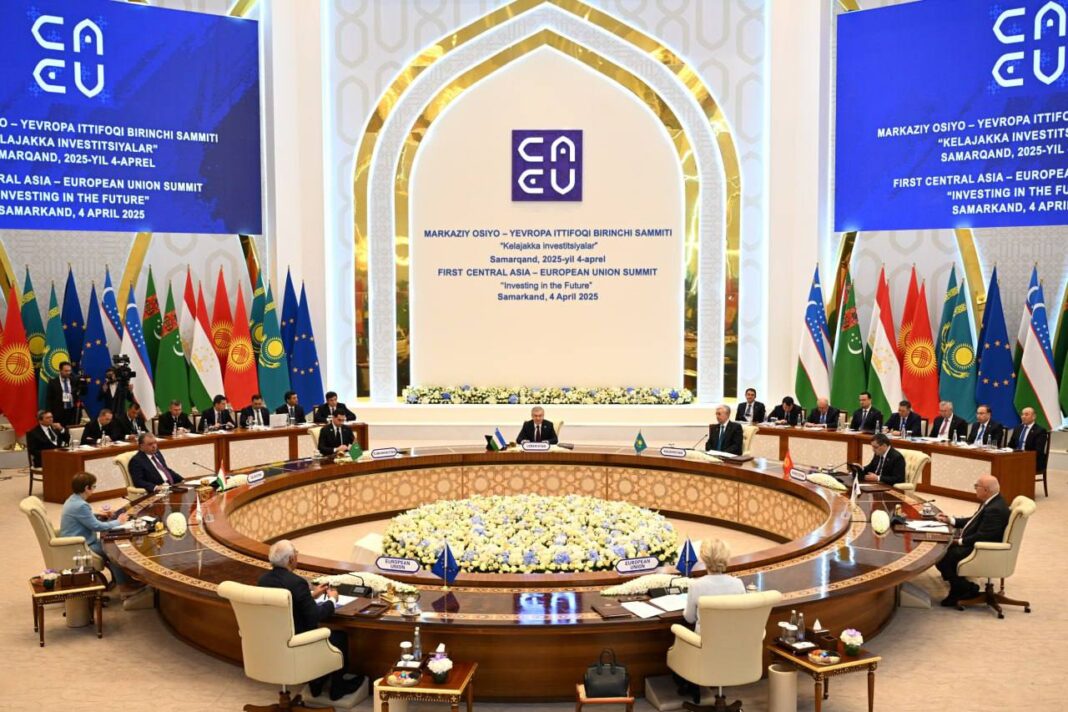BAKU, Azerbaijan, April 5. The first-ever
European Union-Central Asia summit was held yesterday in Samarkand,
Uzbekistan, marking the beginning of a new phase in interregional
cooperation. The event concluded with several major agreements
aimed at strengthening political, economic, and transport ties
between the EU and Central Asian countries. Against the backdrop of
Europe’s growing interest in Eurasia, Azerbaijan’s role as a
strategic bridge between the regions came into sharper focus.
One of the summit’s most significant outcomes was the launch of
a strategic partnership between the European Union and Central
Asian states. European Commission President Ursula von der Leyen
emphasized at a press conference: “Today marks a new chapter in
EU-Central Asia relations. We are launching a strategic
partnership. It means we can rely on each other – which is
especially important in today’s world”.
As part of this deepening partnership, the EU introduced a 12
billion euro investment package under its Global Gateway
initiative. The funding targets four key areas: transport,
environment and water management, energy, and the supply of
critical raw materials.
A major focus of the transport component is the development of
the Trans-Caspian transport corridor – also known as the Middle
Corridor. The EU plans to invest 10 billion euros into the route,
which is already playing a vital role in linking Europe and Asia by
reducing transit times and improving logistics efficiency.
Azerbaijan is central to the success of this corridor. More than
just a transit country, it has become a fully-fledged logistics hub
for the region. Over the past 30 years, Azerbaijan has invested
heavily in upgrading its transport infrastructure—modernizing
ports, railways, and logistics centers. Today, the country operates
the largest commercial fleet on the Caspian Sea, with over 50
vessels. Once current investment projects are completed,
Azerbaijani shipyards will be able to produce 10–15 tankers and
cargo ships per year – double their current output.
These efforts have made it possible to establish reliable
transit routes from Central Asia to Europe and speed up cargo
movement from China to the EU via Azerbaijan. As a result, Baku has
become a strategic partner in enhancing transport connectivity
across the Eurasian region.
The summit also spotlighted climate cooperation. The EU
continues to back projects across Central Asia in renewable energy
and water sustainability, including new hydropower plants. One
initiative gaining momentum is the green energy transmission line
across the Caspian Sea, led by Azerbaijan, Kazakhstan, and
Uzbekistan, which aims to deliver clean energy to European
markets.
Kazakhstan’s Deputy Minister of Energy, Sungat Yessimkhanov,
told Trend that
the project is moving forward: “The heads of state signed the
relevant agreements at COP29 last November in Baku. We are
currently in the active planning stage… Technical requirements for
the cable will be finalized soon”.
The EU has already shown interest in this project, seeing it as
a promising route for sustainable energy supplies from Central
Asia.
Critical raw materials such as uranium, lithium, and rare earth
elements were also high on the agenda. The summit in Samarkand
resulted in a Declaration of Intent between the EU and Central
Asia, along with a roadmap for cooperation in 2025-2026 focused on
clean hydrogen and battery technologies.
Routes for raw materials from Uzbekistan and Kazakhstan to
Europe run through Azerbaijan, which provides reliable logistics
and strong transport security. As Europe’s interest in nuclear
energy grows, Azerbaijan’s role as a transit hub for uranium
becomes even more important.
The Samarkand summit reaffirmed the EU’s commitment to deepening
ties with Central Asia. But delivering on ambitious goals for
transport integration, green transformation, and energy security
will not be possible without Azerbaijan’s active involvement. Baku
continues to strengthen its cooperation with Central Asian partners
and plays a leading role in advancing joint initiatives that matter
not only to the region but to Europe as a whole.
In a rapidly changing global landscape, Azerbaijan is cementing
its position as a crucial bridge between East and West – at the
heart of efforts to build sustainable and mutually beneficial ties
between the EU, the South Caucasus, and Central Asia.

